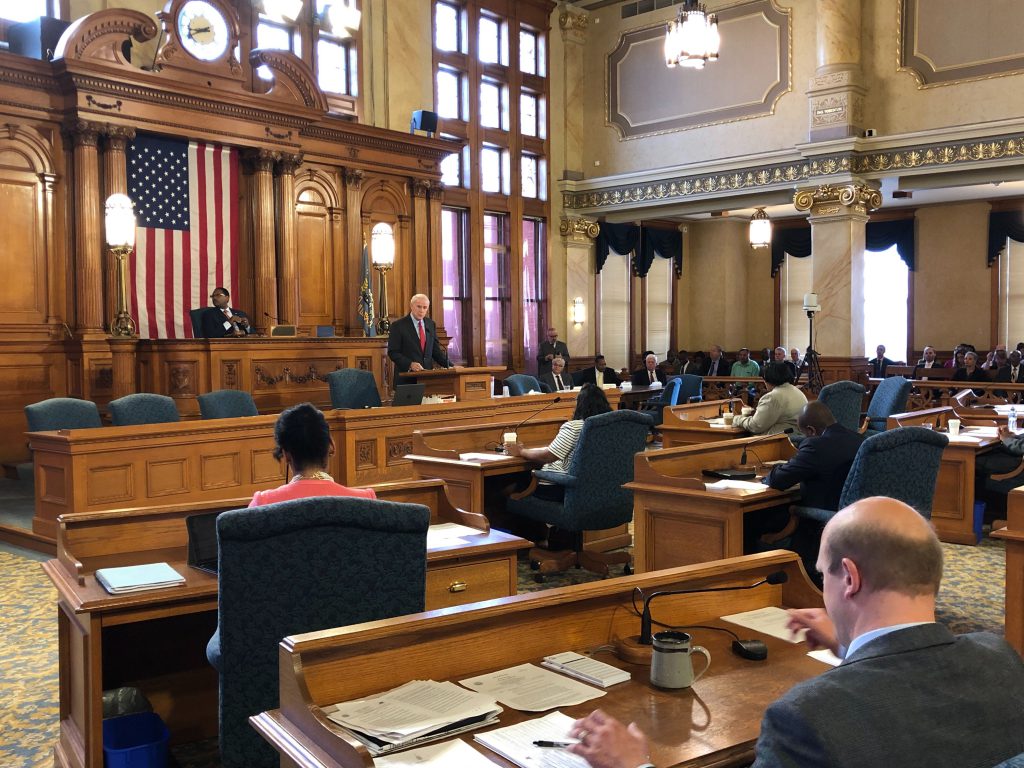Mayor’s Budget Cuts Cops and Property Tax Rate
City squeezed by rising pension costs, declining state aid. Police cuts through retirements proposed.

Mayor Tom Barrett presents his 2020 budget to the Milwaukee Common Council. Photo by Jeramey Jannene.
Despite the fact that the total amount budgeted for Milwaukee Police Department salaries is proposed to increase next year, Mayor Tom Barrett is also proposing to reduce the sworn strength of the department by 60 officers if a one percent sales tax is not approved.
The city’s difficult budget decisions, expected to become worse in the coming years, are caused by rising pension costs, 80 percent of which covers public safety employees, and declining state aid.
Barrett presented his $1.5 billion 2020 budget proposal to the Common Council Tuesday morning and emphasized that the city’s pension structure is not fiscally sustainable.
“Looking forward, the most formidable challenge before us is fulfilling our obligation to fund the city’s pension system,” said Barrett in his budget address. The city, by its charter, is required to fully fund its pension and uses a five-year smoothing algorithm to determine what it needs to contribute. The city’s annual pension contribution was $0 from 2004 to 2009, but has steadily climbed since with a $170 million contribution expected in 2023. The city needs to contribute $70 million this year.
To lessen the blow in future budgets, Barrett is proposing to contribute $8 million to the pension reserve fund.
“We have to have an additional tool to let us help ourselves,” said Barrett about the one percent sales tax effort introduced earlier this month. That tax, backed by Milwaukee County and all 19 county municipalities, would be shared by every entity with 25 percent going towards property tax relief.
A city report notes that if the city received its 2003 allotment of shared revenue adjusted for inflation it would have received $333.9 million in 2018; instead it received $228.2 million, an effective annual loss of $105.7 million. Over the same time, annual state spending has increased by $7 billion.
But to implement it, the tax would require approval from the Wisconsin State Legislature and voters via a referendum. Barrett said the city would use the funding to avoid police cuts, buy equipment for the Milwaukee Fire Department and repair infrastructure.
“We are not laying any officers off,” said Barrett of the service reduction. Similar to a 2018 cut, the budget would reduce sworn strength through not replacing retirees.
“We have to face a practical reality, that for the fifth consecutive year, the budget for the police department exceeds the entire property tax levy for the city,” said Barrett. “Police and fire costs are the areas where we’ve seen the biggest increases. Next year, the increase in the police and fire budgets are larger than all other city departments combined. We have little control of that because of current state law.” Public safety employees were exempted from the state’s Act 10 law that eliminated collective bargaining for public employees.
Barrett also made sure to praise the city’s public safety employees. “I want to be clear: our public safety employees do a great job under challenging circumstances. Key crime statistics are down. Homicides are down. Not-fatal shootings are down. Robberies are down.”
The Mayor said because of the timing of the retirements and police recruiting classes, the cuts would not impact the city’s ability to ensure public safety during the July 2020 Democratic National Convention. Staffing levels at the Milwaukee Fire Department would not be changed by the proposed budget.
The budget proposal includes $21 million to perform lead abatement, including replacing lead laterals. This amount is in line with what the city included in the 2019 budget.
Under Barrett’s proposal, the average Milwaukee homeowner ($117,000 appraised value) would see their property tax bill increase $37 and their fees increase $22. The overall property tax rate would go down by $.01 per $1,000 in assessed value, but the city’s overall levy would grow 3.5 percent due to increased assessments and new construction.
The Common Council will spend the next month reviewing and amending the budget before approving the final budget in November.
More information on the budget will be available when the detailed budget document is introduced.
If you think stories like this are important, become a member of Urban Milwaukee and help support real independent journalism. Plus you get some cool added benefits, all detailed here.
More about the 2020 Milwaukee Budget
- City Hall: Council Overrides Every Barrett Veto - Jeramey Jannene - Nov 26th, 2019
- City Hall: Barrett Issues 8 Budget Vetoes - Jeramey Jannene - Nov 19th, 2019
- This afternoon the City of Milwaukee just got less safe - State Rep. Bob Donovan - Nov 8th, 2019
- City Hall: Council Cuts Police, Adopts $1.6 Billion Budget - Jeramey Jannene - Nov 8th, 2019
- City Hall: Proposal Uses Lead Abatement Funds for Marketing - Jeramey Jannene - Nov 7th, 2019
- Transportation: Street Safety Funding Passes Committee - Jeramey Jannene - Nov 6th, 2019
- Omnibus budget amendment supports birthing moms pilot, violence interrupters, participatory budget initiative and more - Ald. Milele Coggs - Nov 1st, 2019
- Eyes on Milwaukee: Proposal Would Fund Emergency Housing - Jeramey Jannene - Oct 31st, 2019
- City Hall: Proposal Gives Residents a Basic Income - Jeramey Jannene - Oct 31st, 2019
- City Hall: Community Outpouring Over City Budget - Isiah Holmes - Oct 14th, 2019
Read more about 2020 Milwaukee Budget here
























Can someone identify the need for five motorcycle police to escort a Gene Simmons tour bus through the city on Friday the 27th? Might these guys be better off on other duties?